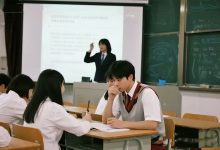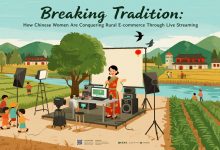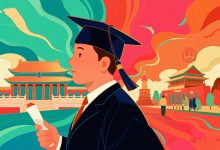The Great Education Migration of 2025
This is a true story about dreams deferred and paths rewritten.
Picture this: Ten thousand applications flooding Hong Kong universities in a single month. A 20% surge that nobody saw coming.
The trigger? America’s door slamming shut.
Since May 2025, the US government has adjusted its China student policies five times. The result? A mass exodus to Hong Kong that’s rewriting the rules of international education.
The Joke That Stopped Being Funny
Zhou Bohao, 21, once told his roommate a joke that now haunts him.
“What does it take to get into a Hong Kong master’s program?”
“PhD-level credentials.”
Back in April, he thought he was being clever. When a Hong Kong university vice dean visited his Beijing campus and told him he’d need a published SSCI Q1 paper just to be considered, Zhou laughed it off.
“Has this school lost its mind?” he thought.
SSCI Q1 papers? That’s PhD territory. Even professors count those as major achievements.
A month later, the joke died.
On May 26th, his agent forwarded a news article: Hong Kong Chinese University had received over 10,000 non-local applications. A conservative 20% increase from last year.
Zhou screenshot the article. Then started writing his first academic paper.
As an undergrad.
The Domino Effect
The math is brutal.
America has 20-30 top-tier universities.
Hong Kong has three.
When thousands of US-bound students pivot to Hong Kong, it’s like pouring an ocean into a teacup.
Wen Wen, a decade-long education consultant, had never heard of “published research” as a master’s entry requirement. When she heard Zhou’s story, her first reaction was disbelief.
“Who told him this? His agent must be wrong.”
But she was wrong.
The competition had fundamentally changed.
The American Dream, Interrupted
Zhao Ruiping’s story is different but equally telling.
A 21-year-old economics major in a Sino-US joint program, he’d planned his American journey since freshman year. The program was simple: three years in China, final year in the US.
In 2024, when Zhao made his plan, it was the “honeymoon period” for Chinese students in America. Biden’s administration had reopened doors closed during COVID. Restrictions were relaxed. International programs ran smoothly.
Nobody imagined what was coming.
The Rejection Letters
May 20, 2025.
Zhao’s roommate gets rejected for a US visa. For a joint-program student, this was unheard of.
The interview lasted 15 minutes. Questions came rapid-fire. No explanations allowed.
Rejection.
May 22, 2025.
Harvard stops accepting new international students.
May 27, 2025.
Secretary of State Marco Rubio suspends all student visa interviews.
Then came “Catch and Revoke.”
The plan? Analyze Chinese students’ social media. Revoke visas retroactively. 270,000 students potentially affected.
This wasn’t about what you’d done anymore.
It was about who you were. What you thought. What you might think.
The Lucky Ones
Zhao got his visa on April 29th.
He made it by days.
His roommate? Still waiting in August, with classes starting soon. No visa. No certainty. No plan B.
During their weekly calls home, Zhao noticed his father’s hesitation whenever America came up.
One April evening, Zhao preempted the conversation:
“Dad, I don’t think I want to go to America anymore.”
His father’s relief was audible. Within minutes, three videos arrived on WeChat: “Trump Administration’s Unprecedented Crackdown on Chinese Students,” “Chinese Students Face Precision Targeting,” “Florida University Shooting.”
Real or fake, the message was clear.
His family was scared.
The New Reality
By June, the landscape had completely shifted.
Zhou, once targeting only Hong Kong’s top three universities, now added fourth and fifth-tier schools to his list.
“Getting into Hong Kong Polytechnic would be a miracle,” he admitted.
Zhao, an economics major, deliberately avoided his best-fit program—Financial Technology.
“It’s too competitive. I’ll apply for something less popular just to get into HKU.”
The 20-80 Rule
Zhou observed a cruel pattern:
“20% of applicants are taking 80% of the offers.”
“It’s not competition anymore. It’s a stampede.”
Those who’d prepared for American applications—with their GRE scores, research papers, and polished profiles—dominated the Hong Kong applicant pool.
Everyone else scrambled for scraps.
The Conservative Choice
In Zhao’s joint program, less than 10% still plan to study in America.
The calculation is simple:
Working in America after graduation? Nearly impossible for non-STEM majors.
Returning to China immediately after an expensive US degree?
“Low ROI,” Zhao says bluntly.
When asked if Trump’s June statement welcoming Chinese students changed his mind, Zhao’s answer was immediate:
“No. I want stability.”
The Scramble
May 2025.
Zhao juggles final exams while rewriting application materials.
9 AM: Sits down to study.
9:20 AM: Professor calls about a Hong Kong university presentation. Four hours gone.
2 PM: Returns to library.
2:15 PM: Agent demands updated documents. “Submit today or miss the deadline.”
8 PM: Finally looks up from paperwork. Hasn’t eaten. Eyes blurred.
Tomorrow’s exam remains untouched.
What This True Story Really Means
This isn’t just about visa policies or application statistics.
It’s about an entire generation recalculating their futures in real-time.
About dreams deferred and paths hastily redrawn.
About parents sending worried videos at midnight.
About undergrads writing PhD-level papers just to compete.
About choosing safety over ambition.
The great irony? Many of these students would have been America’s gain. Future innovators. Bridge-builders. The best and brightest choosing to study elsewhere.
Not because they wanted to.
Because they had to.
The Bottom Line
Hong Kong’s universities are seeing unprecedented application numbers.
Not because they suddenly became better.
But because America made itself unreachable.
In this true story of educational musical chairs, everyone’s fighting for a seat. And when the music stops, not everyone will have one.
The joke Zhou told in April isn’t funny anymore.
Now, it’s just reality.
Based on true stories from Beijing and Xi’an, 2025. Names have been changed to protect privacy.
Keywords: true story, Chinese students, US visa policy, Hong Kong universities, international education, student migration, Trump administration, education crisis, real experiences








